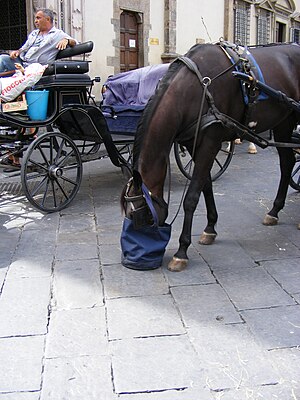σφυρίς
ἐκ Χάεος δ' Ἔρεβός τε μέλαινά τε Νὺξ ἐγένοντο... (Hesiod's Theogony 123) → From Chasm, Erebos and black Night came to be...
English (LSJ)
ίδος, ἡ,
A = σπυρίς (q.v.); nose-bag, nose bag, nosebag, feedbag, feed bag, feeding bag, morral, nosebag for cattle, nosebag for horses, feedbag, feed bag, feeding bag, morral, nose-basket, PSI5.543.54 (iii B.C.).
German (Pape)
[Seite 1052] ἡ, att. statt σπυρίς, Geopon.; auch Hippocr.; s. Lob. Phryn. 113.
Greek (Liddell-Scott)
σφυρίς: Ἀττ. σπυρίς.
Greek Monolingual
Dutch (Woordenboekgrieks.nl)
σφυρίς -ίδος, ἡ, zie σπυρίς mand, korf.
Frisk Etymological English
See also: s. σπυρίς.
Frisk Etymology German
σφυρίς: {sphurís}
See also: s. σπυρίς.
Page 2,835
Wikipedia EN

A feedbag, feed bag, feeding bag, nosebag, or morral, is a bag, filled with fodder, and attached to the head of a horse, enabling it to eat. The main advantages are that only a small amount of the feed is wasted, and it prevents one animal consuming the ration of another.
It can be made of leather, reeds, but more commonly is a thick fabric or light canvas. Some modern designs are made of Cordura or other durable nylon, with a solid bottom and mesh sides for ventilation.
To access the portion of the feed near the bottom of the bag, the horse needs to be able to touch its head to the ground, allowing it to push its nose into the end of the bag.
In popular US culture, the feedbag is used in the expression "strap on the old feedbag", meaning to "dine". It suggests that the diner will pay little attention to etiquette, and will dine heartily. The term is also found in numerous restaurant names.
Translations
Bulgarian: торба за зоб; Catalan: morral; French: musette; German: Futtersack; Ancient Greek: χιλωτήρ; Irish: socmhála, mála cinn
